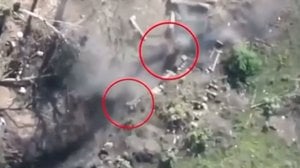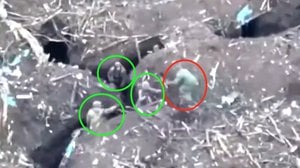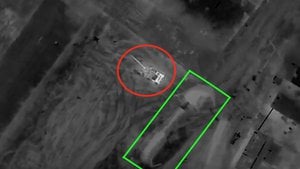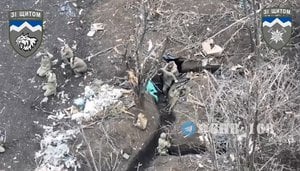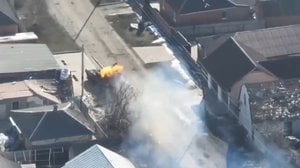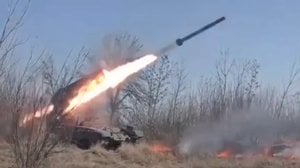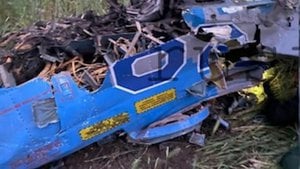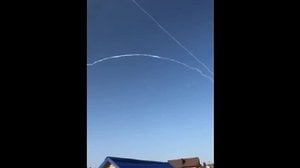
Drone Smashes Port of Odessa
Published 9 months ago
Correction: This video, taken on July 24 by merchant sailors, shows a Russian drone (provided by Iran) smashing into the Port of Reni, Odessa Oblast, situated on the border with Romania (not Odessa as originally posted). If one observes closely, the drone can be spotted just to the right of the center of the screen, just before it completes its dive and detonates. The fireball is pretty impressive, and the damage must have been considerable. There seems to be no attempt by air defense to intercept the drone – either assets were not in the area, or they were already engaged with other targets.
This brings up the issue of escalating naval conflict in the Black Sea after the expiration of the Black Sea Grain Initiative. This arrangement, brokered last year by Turkey and the United Nations between Russia and Ukraine, allowed for both parties to export grain from Black Sea terminals. Both countries are major exporters of grain, and the agreement was seen as essential for maintaining stable food prices and preventing developing countries from experiencing food insecurity or famine. The deal was extended several times, but last week Russia refused to extend the deal further. After the arrangement expired, Ukraine launched an attack against the Kerch Strait Bridge which connects Crimea with mainland Russia, and Russia responded with massive airstrikes against Ukrainian port facilities and gran stockpiles. The current situation is complex and the consequences will be experienced globally.
It now appears that Russia tolerated the Black Sea Grain Initiative as long as they did because they anticipated the impending defeat of the Ukrainian state, or Ukraine being pushed to the bargaining table by its western allies, which would have been the same as defeat. Russia’s price for continuing the deal was reinstatement to the SWIFT banking system, which would solve some of the liquidity issues faced by the Russian financial sector. Western allies refused to grant this concession, and so Russia withdrew, choosing instead to pressure the west by using food as a weapon against the west while also attacking Ukraine financially. By refusing to participate in the grain initiative, Russia can frame the West and its allies as the party responsible for cutting Ukrainian grain shipments, driving up world food prices, and possibly triggering famine in the developing world. At the same time, Russian attacks against Ukrainian port infrastructure prevent Ukraine shipping its major export to world markets, now or in the near future. The fact that Russia would attack not just the major port of Odessa but Reni, which lies on the banks of the Danube just a few hundred meters from a NATO country, illustrates the seriousness of the situation.
This issue has created an interesting problem for Ukraine. For the present, grain shipments have stopped. A look at the website or app Marine Traffic, which monitors the AIS transponders of ships across the globe, shows that commercial traffic continues to flow to Russia, up the Danube, and to other ports on the Black Sea, while the only vessels in or around Ukrainian ports are trapped there and cannot leave. Ukraine is scrabbling to reposition air defense assets as the systems in place are being overwhelmed by the sheer numbers of missiles and drone that have targeted the port. Even if it can protect the port and its facilities, ships attempting to enter or leave Ukraine face a gauntlet of Russian corvettes, sea mines, drones, and aircraft.
Russia, on the other hand, currently has air superiority, but it is unknown how long it can maintain that advantage. It has limited stockpiles of missiles and drones, while Ukrainian air defenses will only improve as they reposition existing systems, obtain additional systems like those pledged by Rheinmetall, and once their F-16 squadrons are active. Russia can institute a naval blockade, and there is every indication that they are exercising this option, but Russian ships will face threats from land-based missile systems, naval drones, and sea mines, all of which Ukraine has already employed in this conflict. Additionally, the introduction of F-16s will increase the reach of Ukrainian anti-ship defenses.
A shooting naval war poses a variety of risks for everyone. The U.S. has traditionally reacted rather harshly towards interference with seaborne trade, and a variety of responses have been suggested to open the sea lanes to Ukrainian ports. Prior to the expiration of the grain deal, Turkey announced that its navy would escort ships in and out of Ukrainian ports, but then refused to take action once the deal expired. Pundits and loud voices in the Twitterverse have suggested that other NATO navies escort grain ships in the Black Sea or that norther NATO states impose a blockade of Russian ports in the Baltic Sea, namely Kaliningrad and St. Petersburg. Blockades suffer the same problem as no-fly zones, which were requested by Ukraine last year to deny Russians use of their air space. In order to enforce a blockade or a no-fly zone, your armed forces must enforce it, and when a ship or a plane fails to comply, your commanders may have to do more than fire a shot across the bow. A blockade creates the risk of direct conflict between Russian and NATO forces, and most NATO allies do not have the stomach for that at the present.
Of course, it would be helpful if a NATO ally controlled access to the Black Sea, and could deny passage to Russian ships attempting to export grain… oh wait! That would be Turkey. Any ship leaving or entering the Black Sea has to pass through the Bosphorus and Dardanelles Straits, both of which are in Turkish territory (the British Empire’s attempts to seize the land surrounding the Dardanelles during World War I resulted in the disastrous Gallipoli Campaign). Turkey could conceivably deny Russian ships the right to transit these straits until they agree to resume the Black Sea grain Initiative, but they run the risk of triggering a global food crisis, and Putin seems willing to let millions starve if it serves his interests.
Diplomatic pressure from China may provide the solution to this crisis. China possesses ten percent of the world’s arable land and twenty percent of the world’s population, which has resulted in China being a net importer of grain and fertilizer, particularly from Ukraine. Prior to the war, Ukraine exported over 8 million metric tons of grain to China annually, but now that source is in jeopardy. A shortage of grain and rising food costs will not help their existing inflation woes, and so China has urged both sides to renew the deal, and they will likely exert some diplomatic pressure on Putin behind the scenes.
In the meantime, Russia is attempting to use this situation as leverage to boost diplomatic ties in developing regions, such as Africa. On Thursday, Russia kicked off a summit with the leaders of African nations, pledging improved security deals and offering free grain to the continent. Prigozhin made the rounds in an unofficial capacity, praising the recent coup in Niger and pledging Wagner fighter to help guarantee “security.” In exchange for these “gifts,” Russia (and Wagner) gain direct control of resources such as mines producing gold, diamonds, and rare earth metals. The turnout to this summit was less than in previous years, and Putin will have to overcome the diplomatic fallout of his withdrawal from the grain deal and his inability to attend the BRICS summit in South Africa as a result of an arrest warrant issued by the ICC. Yet, a lack of engagement or investment in Africa by the West has left the continent uniquely vulnerable to this type of exploitation by Russia and China (the latter through their Belt and Road Initiative), and for many in Africa Wagner PMC is a source of security, and Russian Su-25s are the sound of freedom. Putin may well be able to preserve his diplomatic hold in Africa by guaranteeing a trickle of grain to the continent.
About the Author
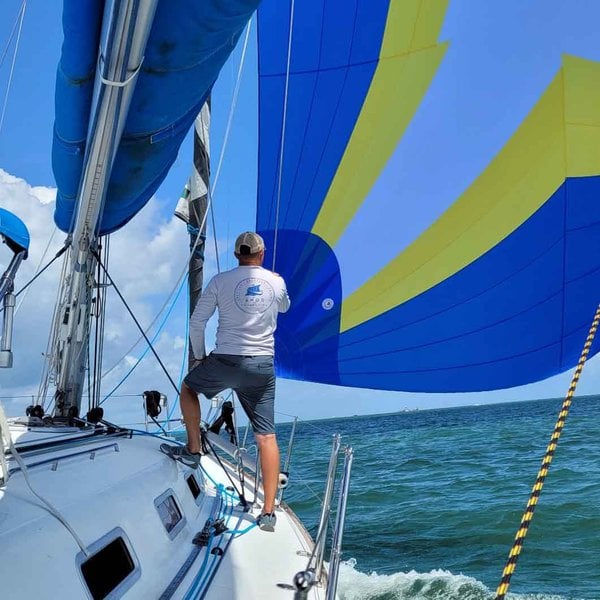
Cam
Cam served as an infantry officer in the Marine Corps, deploying to the Horn of Africa and participating in combat operations in Iraq. He currently works in the maritime industry and in the defense sector as an instructor of combined arms planning and operations. An avid sailor, Cam founded and directs a nonprofit that supports veterans and first responders through sailing.


